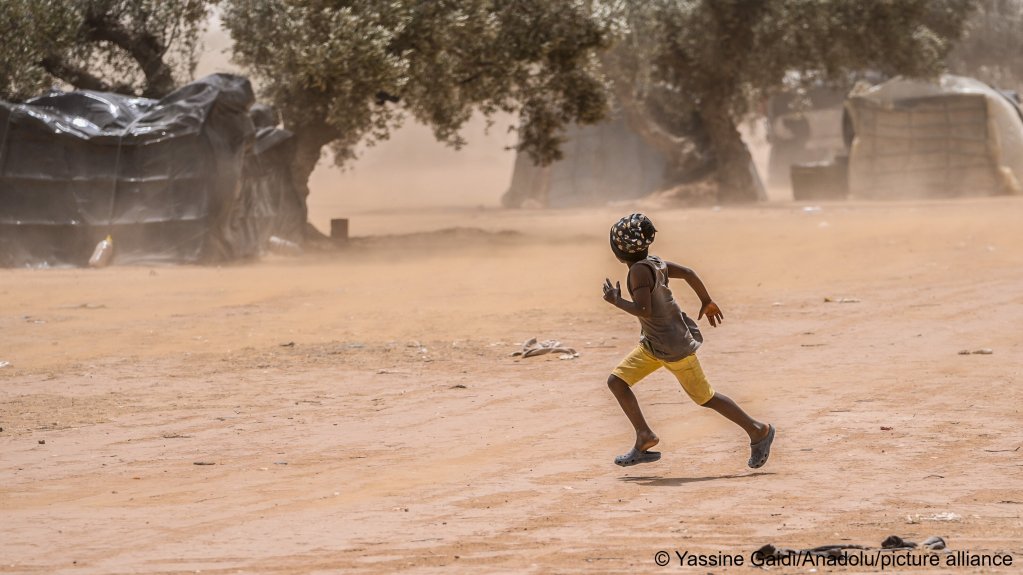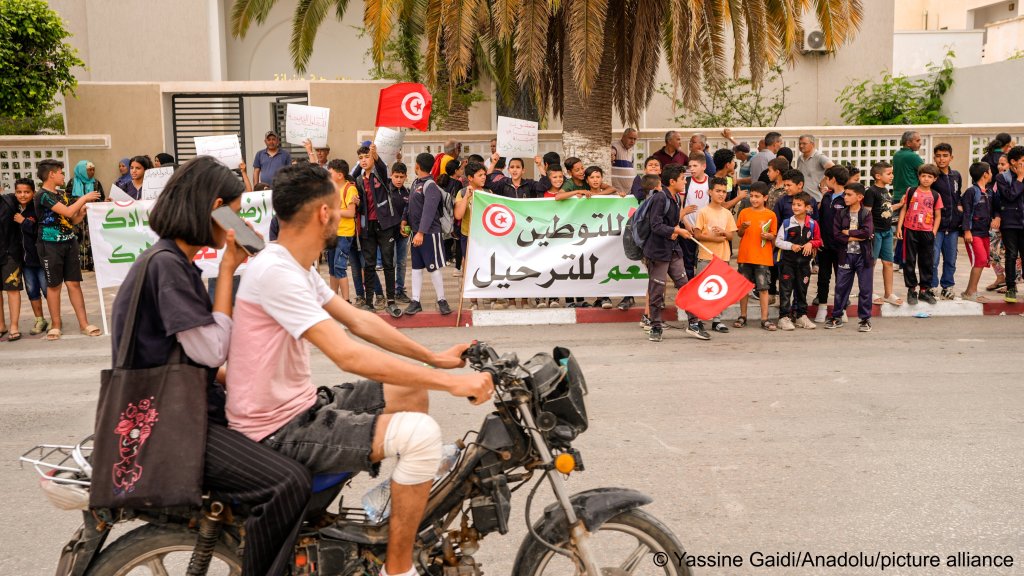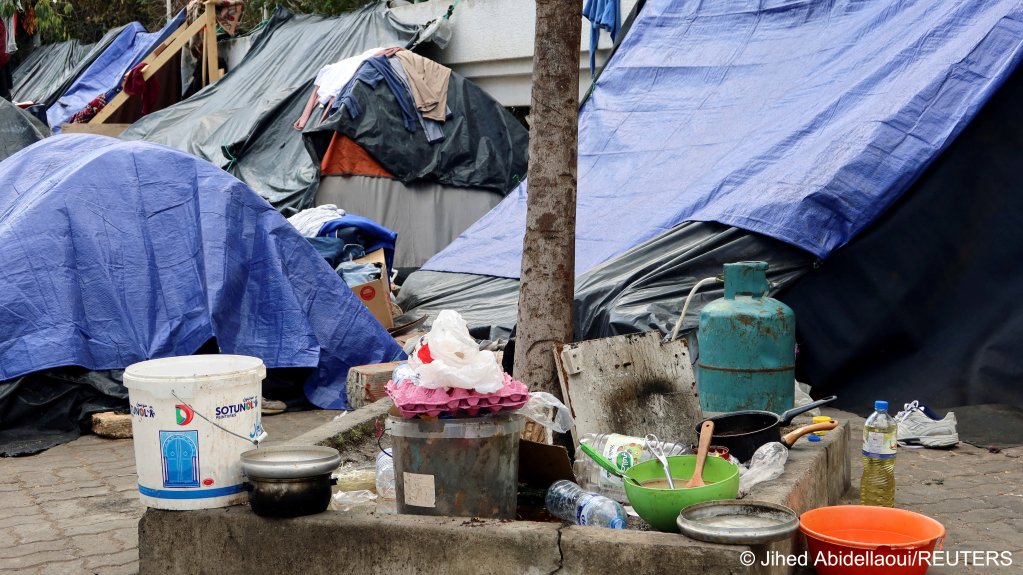Tunisian authorities have reportedly dismantled improvised camps housing around 7,000 sub-Saharan African migrants. They have furthermore begun to forcibly deport some of them, according to media reports.
Tunisian police, carrying batons, moved through an area with olive trees. Migrants ran away as their tents were set on fire.
Some migrants watched as smoke rose from their burning shelters. "I don't know what to do," Bakayo Abdelkadeur, a 26-year-old from Mali, told news agency AFP while holding blankets.
Last Friday (April 4), authorities began dismantling camps housing some 7,000 undocumented migrants from sub-Saharan Africa, news agency AFP reported citing police sources. The clearing of the camp reportedly followed a campaign against them on social media.
Tunisia's national guard spokesperson, Houcem Eddine Jebabli, stated that a considerable number of people were forcibly deported, news agency Reuters reported, though he did not give an exact figure or explain to where the migrants may have been deported.
Jebabli also said that a number of migrants were arrested for violence during the ongoing operation and that authorities seized bladed weapons, such as knives and swords.
Read Also
Tunisia: Hundreds of migrants intercepted at sea are nowhere to be found
Tens of thousands live in tent camps, claim Tunisian authorities
Around 20,000 migrants had reportedly set up tents in fields in the regions of El Amra and Jebeniana, according to Tunisia's government.

Jebabli reportedly said that approximately 4,000 migrants of different origins vacated one of the cleared camps, adding that further operations were planned. Some migrants "dispersed into the countryside", AFP quoted Jebabli as saying, while pregnant women and those needing medical care received assistance from health officials according to Jebabli.
The situation is becoming increasingly tense due to anti-migrant sentiment and demands to deport the migrants from the area by local residents, who in the past have reportedly clashed with migrants on a frequent basis.
The camps had reportedly caused anger from residents in nearby villages, which raised the pressure on the authorities.
According to Jebabli, locals had taken legal action over the migrants occupying their olive groves. "It was our duty to end all the disorder," he said.
Local human rights groups, on the other hand, have accused the authorities of racist rhetoric and incitement against migrants, news agency Reuters reported. The rights groups also deplored an alleged crackdown that led to the imprisonment of activists who helped African migrants.

Migrants from sub-Saharan African countries had been living in informal camps in olive groves near El Amra, located some 30 kilometers north of Tunisia's second-largest city Sfax, for about two years.
Read AlsoIn Tunisia, migrant women are highly vulnerable to sexual assault
'We've suffered a lot'
Benjamin Enna picked up a spoon and a small pack of powdered juice -- leftovers of the so-called Kilometer 25 camp. The 29-year-old Nigerian told AFP he survived a shipwreck in the Mediterranean and had hoped to join his brother in Italy.
Now he's torn between returning to Nigeria, working in Tunisia and trying to reach Europe again, AFP reported. "My head's all mixed up," he said.
No matter if they wanted to go home or were undeterred about trying to arrive in Europe, nearly all migrants AFP spoke to around El Amra had one thing in common: they want to leave Tunisia.
"We've suffered a lot," said 25-year-old Guinean Camara Hassan, a former student of international relations who spent two months in a Tunisian prison, according to AFP. "One way or another we'll make it," he added.
Other migrants are frustrated by delays in voluntary return flights facilitated by the UN migration agency IOM. "I want to go back to Ivory Coast, but the IOM [flights] are full," one of them said.
A visibly exhausted 29-year-old Cameroonian, who insisted on staying anonymous, described the situation as "horrible," adding that "they treat us like we're not human."
According to AFP, the national guard spokesman Houcem Eddine Jebabli defended the police operation as "humane", saying that officers did not use tear gas. Asked what would happen to the migrants without their shelters, he said many would benefit from the "voluntary returns", while others have "dispersed into the wild".

Numerous police vehicles and tractors were used in the operation, which, according to Romdhane Ben Amor of the Tunisian Forum for Economic and Social Rights (FTDES), was intended to disperse the migrants and reduce local discontent.
"It won't work," he told AFP. "They'll regroup and build new camps because they have nowhere else to go."
On Saturday, groups of migrants could reportedly be seen walking along a road not far from El Amra, moving in the direction of other olive groves.
Read AlsoItaly confirms 20 million euros for voluntary repatriation program
Call for more voluntary returns
Late last month, Tunisian President Kais Saied called on the UN migration agency IOM to accelerate voluntary returns for irregular migrants to their home countries.
As of Wednesday (April 2), the IOM said it had arranged 1,740 voluntary returns, following nearly 7,000 last year, or three times as many as in 2023. But rights groups are sceptical, AFP reported.
In recent years, Tunisia has become a key departure point in North Africa for migrants attempting the dangerous Mediterranean Sea crossing in the hope of reaching Europe.
Many migrants arrived after crossing the deserts of Algeria and Mali, hoping to reach Italy. But tighter controls on the sea route have left them stranded. Last year, Tunisia signed a 255-million-euro deal with the European Union, nearly half of which is earmarked for tackling irregular migration. Earlier this year, the British government struck a deal with Tunisia to "target the root causes of migration."
The situation for migrants in Tunisia, meanwhile, remains dire. In early 2023, Saied made xenophobic remarks against migrants, causing physical and verbal attacks against Black people in Tunisia to multiply.
Then, after a Tunisian man was killed in a fight involving several migrants last July, Tunisian authorities reportedly began carrying out large-scale expulsions of migrants from Sfax to desert regions bordering Libya and Algeria.
with AFP, Reuters
